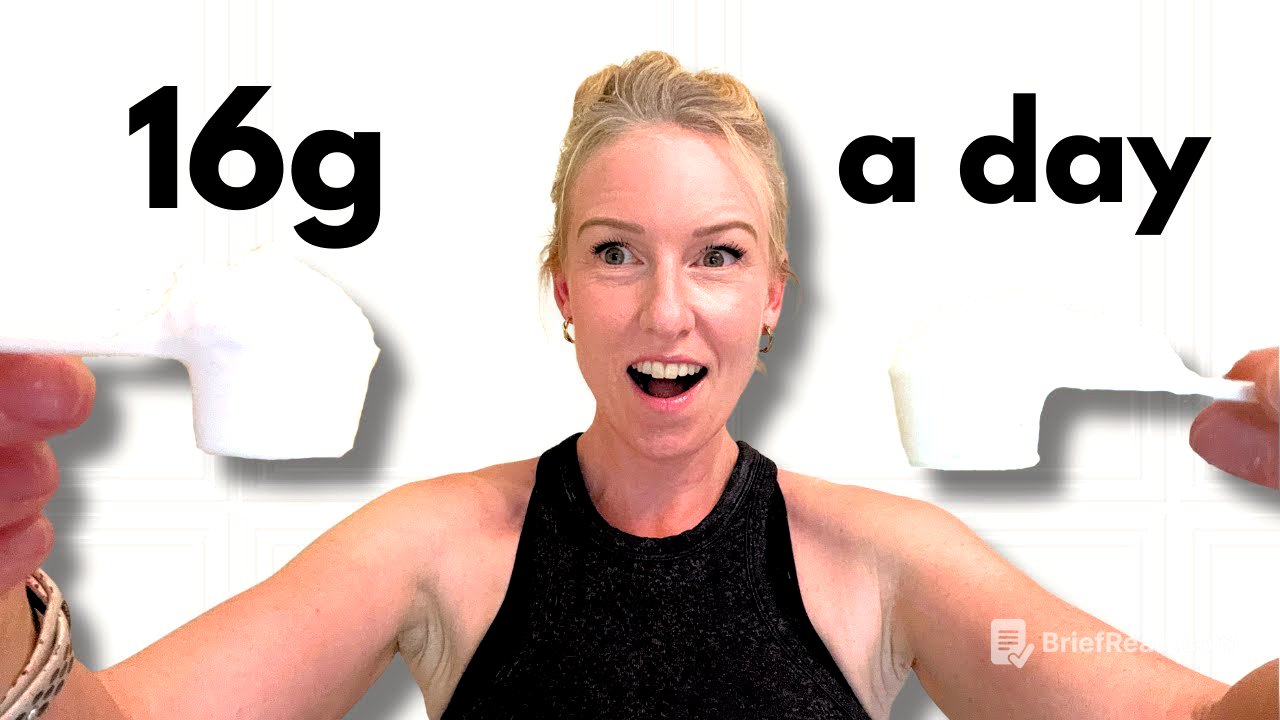TLDR;
This video discusses the benefits and potential downsides of taking creatine, a supplement known for improving performance. Laura Try shares her personal experiment of taking three times the recommended dose (16g) of creatine daily for two months, detailing the positive impacts on her physical and mental performance, including breaking through exercise plateaus, increased mental capacity, and improved recovery. She also addresses common concerns about creatine, such as stomach issues, weight gain, and kidney damage, based on her experience and blood test results.
- Creatine is a safe and effective supplement for improving muscle mass, strength, speed, power, and recovery.
- It also has cognitive benefits, such as improved mental performance, reaction time, memory, attention, and focus.
- High-dose creatine may provide additional benefits for the brain, especially during periods of high stress or sleep deprivation.
Introduction to Creatine [0:00]
Creatine is a naturally occurring substance in the body, produced in the liver and brain, and is essential for energy in muscles and the brain. It can be supplemented to enhance energy levels, leading to improvements in both health and performance. Creatine monohydrate is the most researched and safest form of creatine, offering benefits such as improved muscle mass, strength, speed, power, and recovery after exercise. These benefits extend beyond athletes to everyday individuals, as exercise is vital for long-term health at any age. Supplementing with creatine can aid in building muscle faster and improving bone mineral density, particularly beneficial for older adults and women around menopause.
Benefits of Creatine for the Brain [2:03]
Creatine supplementation benefits the brain by providing it with more energy, as the brain utilizes 20% of the body's daily energy. This leads to improved mental performance, reaction time, memory, attention, and focus, especially during sleep deprivation, high-stress periods, brain fog, and travel across time zones. Stress depletes creatine levels, so supplementing with it provides additional energy to counteract this depletion. The body prioritizes creatine for muscles over the brain with a standard 5g dose, and higher doses (10-20g) allow the excess creatine to fuel the brain.
Potential Downsides and Concerns [3:28]
While creatine offers numerous benefits, some individuals may experience an upset stomach or nausea, especially with high doses taken all at once. Creatine can cause weight gain due to water being pulled into the muscles, which improves muscle performance and firmness rather than causing water retention under the skin. It's important to note that creatine does not cause kidney damage in healthy individuals with healthy kidneys. Consulting a healthcare professional is advised if there are concerns about taking creatine.
Personal Experiment with High-Dose Creatine [4:36]
Laura Try shares her experience of taking 16g of creatine daily, split into two doses, after previously taking 5g daily for 2.5 years. She mixes 8g of creatine monohydrate powder in her mint tea in the morning and another 8g in her workout drink, consuming it over three hours. Vegetarians, vegans, women, and seniors tend to respond well to creatine supplementation. As a woman approaching middle age with ADHD, Laura finds creatine beneficial for her busy brain, which tends to use a lot of energy.
Positive Results and Mental Capacity [5:57]
During her experiment, Laura broke through an exercise plateau by increasing weights and reps, which she attributes to a combination of high-dose creatine and increased protein intake (minimum 150g a day). Despite being on a calorie deficit and losing 3kg of body fat, she was able to lift more weight for more reps, and her muscles appeared bigger due to the extra water in them. She also experienced increased mental capacity and brain power throughout the day, even when her ADHD medication wore off.
Recovery and Overall Well-being [8:35]
Laura's recovery scores improved, with her body recovering faster after exercise, making her feel like she was in her 30s again. Her resting heart rate decreased, and her heart rate variability increased, indicating improved fitness and recovery. While acknowledging that moving into a new house and having good company also contributed to her well-being, she notes significant improvements in her stats over the last four weeks. She experienced no stomach issues or nausea, and her blood tests showed excellent organ and kidney health.
Future Plans and Dosage [10:24]
Given the positive results, Laura plans to continue taking creatine but will reduce the dose to 10g daily, as the long-term effects of high-dose creatine are not yet proven. On days with insufficient sleep, high stress, or brain fog, she will take 18g of creatine for an extra boost. She encourages viewers to share their experiences with creatine and their daily dosage in the comments.









